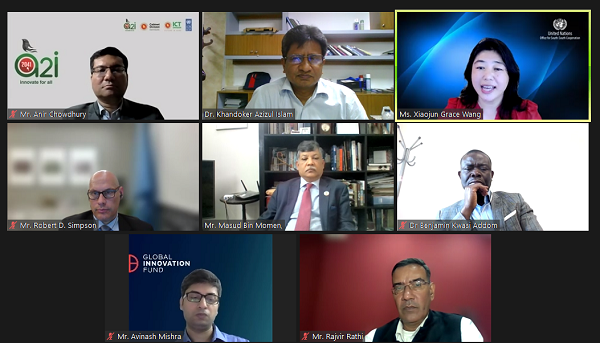Speakers at a high-level virtual event focused on exchanging best practices and expertise about the digital revolution of agriculture supply chain management in order to secure global food security in the new normal. A sustainable agricultural ecosystem can harness greater benefits for food and other industries with the participation of public-private organizations. They also underscored the importance of developing a simplified food data system using crowdsourcing, satellite data, and various digital data systems for agriculture supply chain management to ensure food security. The speakers made these remarks at a side event of the United Nations High-level Political Forum on Sustainable Development (HLPF) 2022. This event brings governments, development partners, UN entities and the private sector together to share their expertise and practices.
At the side event, speakers also highlighted cross-sectoral coordination and networks of communication within the governments of the different countries as facilitating the effectiveness of policies to contribute toward ensuring food security for all. They also stressed the need for public-private partnerships to build a sustainable logistics solution framework. Using the latest 4IR technologies such as blockchain, some of the emergency solutions can be transformed into a sustainable agriculture supply chain management system for greater benefits.
In his welcome remarks, Foreign Secretary Mr. Masud Bin Momen said that agriculture is an economic pillar for many of our countries, without doubt. The impact of the pandemic has both been enforced and imposed on us to adopt a more digital approach to life and living. So, there is no alternative to developing a strong supply chain connecting rural and marginal farming units into the global market to utilize their resources fully to contribute more to mitigating global hunger. He said Bangladesh has had unprecedented success in the last decade in agriculture research, food engineering, cultivation, climate adversity, and sustainable farming. Bangladesh witnessed many economic activities that took place digitally. Now, we are thinking of bringing these new ideas of efficient production processes to farmers, buyers, suppliers, and the whole supply chain, especially during the pandemic, which is continuing its services. Therefore, it’s a time of sharing experience and expertise with the rest of the world to ensure global food security.
At the event, Mr. Anir Chowdhury, Policy Advisor, a2i, and Advisor of South-South Network for Public Service Innovation (SSN4PSI) presented the keynote presentation on the future preparation of an integrated agriculture supply chain for resilient food security. He highlighted Bangladesh’s traceability initiative for food and other industries in the Covid-19 period, where he gave importance to developing a food data system using crowdsourcing, satellite data, and various digital data systems for agriculture supply chain management to ensure food security in the new normal. He also underscored collaboration in value chain actors and added that institutional transformation is absolutely paramount in the Covid-19 period and makes some of the essential initiatives sustainable for greater benefit across the globe.
In the closing remarks, Ambassador and Permanent Representative of Senegal to the United Nations H.E. Cheikh Niang and United Nations Office for South South Cooperation (UNOSSC) Deputy Director for Programme and Operations Ms. Xiaojun Grace Wang emphasized the importance of deploying a coordinated communication system in agriculture supply chain management to ensure global food security in the post-pandemic period.
At the side event, a panel discussion was also held on the ‘Digital Transformation of Agriculture Supply Chain Management to Ensure Food Security in the New Normal’, where the panelists shared the best practices of their own countries and exchanged views on how they utilized knowledge and tools for mutual benefit.
Foreign Secretary (Senior Secretary) of the government of the People’s Republic of Bangladesh Mr. Masud Bin Momen moderated the panel discussion. Additional Secretary (Planning and Development Wing) of Information & Communication Technology Division of Bangladesh Dr. Khandoker Azizul Islam; Executive Director of Uganda’s Agro Supply Limited Mr. Joseph Ogwal; Director of Public Affairs, Science and Sustainability, South Asia of Bayers Cropscience Limited Mr. Rajvir Rathi; Managing Director of Global Innovation Fund Mr. Avinash Mishra; Representative in Bangladesh of Food and Agriculture Organization (FAO) of the United Nations Mr. Robert D. Simpson; and Adviser of Agriculture and Fisheries Trade Policy, Commonwealth Secretariat Dr. Benjamin Kwasi Addom were present as the panel discussants.
Among others, representatives of the UN Member States, international organizations, the private sector, academia, major groups, and other stakeholders participated in the webinar. The Permanent Mission of Bangladesh to the United Nations, Government of Bangladesh, The Permanent Mission of the Republic of Senegal to the United Nations, United Nations Office for South-South Cooperation (UNOSSC), United Nations Development Programme (UNDP), and South-South Network for Public Service Innovation (SSN4PSI) organized this year’s side event, partnered with the Food and Agriculture Organization of the United Nations (FAO), The Commonwealth Secretariat, Global Innovation Fund, Agro Supply Limited, Bayer Cropscience Limited, and Public Digital.


















